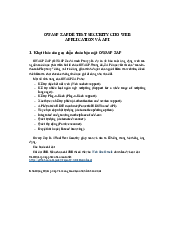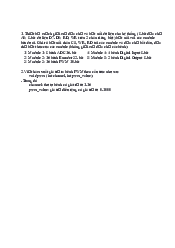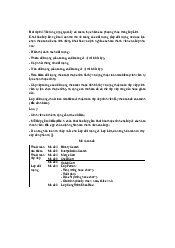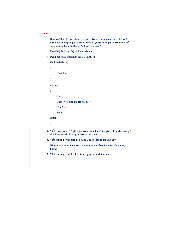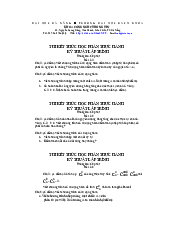
































Preview text:
Programming Intel i386 Assembly with NASM Yorick Hardy
International School for Scientific Computing 1 NASM
NASM can be used in combinations of the following
• With C/C++ to define functions that can be used by C/C++
• To construct a program in assembly language only
• To construct a program in assembly language which calls C functions
The mechanisms to do this depend on the compiler.
We will consider the GNU Compiler Collection (GCC). 2 NASM: C calling conventions
Parameters are passed on the stack. Functions are called us-
ing the call instruction which pushes the return address on
the stack before jumping to the function pointer.
Functions return to the stored address by popping the address
off the stack and jumping to the return address using the ret instruction.
The return value is usually assumed to be in eax. ... call zero_eax
; push the return address on the stack ... zero_eax: xor eax, eax ret
; the return address is in [esp] 3 NASM: C calling conventions
When using GCC we consider cdecl, stdcall and other calling conventions.
• cdecl: Parameters are pushed onto the stack in right to
left order before the function call, and removed in left
to right order after the function call. It is the caller’s
responsibility to remove the parameters from the stack after a function call.
• stdcall: Parameters are pushed onto the stack in right to
left order before the function call, and removed in left to
right order before returning from function call (unless the
function takes a variable number of arguments). It is the
callee’s responsibility to remove the parameters from the stack after a function call.
• other: A combination of stack, registers and memory ad-
dresses may be used to define the calling convention. Usu-
ally, these functions cannot be called from C/C++. 4 NASM: cdecl calling convention
int add(int a, int b) { return a+b; } ... push b push a call add add esp, 8 ;or pop ebx ; remove parameter ; pop ebx ; remove parameter ... add: ; [esp] is the return address,
; [esp+4] the first parameter, etc. mov eax, [esp+4] add eax, [esp+8] ret 5
NASM: stdcall calling convention
int add(int a, int b) { return a+b; } ... push b push a call add ... add: ; [esp] is the return address,
; [esp+4] the first parameter, etc. mov eax, [esp+4] add eax, [esp+8] push ebx ; save ebx mov ebx, [esp+4] ; return address (after ebx) sub esp, 16
; ebx, ret addr, 1st param, 2nd param push ebx ; restore return address mov
ebx, [esp-12] ; 16-4 for return address ret 6 NASM: cdecl calling convention
We will consider the cdecl calling convention.
To avoid the pointer arithmetic we usually follow the conven- tion
1. On entry to the function the return address is in [esp],
the first parameter in [esp+4], etc. 2. Save ebp: push ebp
3. Save the current stack pointer in ebp: mov ebp, esp
4. Now the saved ebp is in [ebp], the return address is in
[ebp+4], the first parameter in [esp+8], etc.
5. Before ret, remember to restore ebp: pop ebp 7 NASM: calling assembler from C /* fact.c */ #include extern int factorial(int); int main(void) { printf("%d\n", factorial(5)); return 0; } 8
NASM: calling assembler from C++ // fact.cpp #include using namespace std; extern "C" int factorial(int); int main(void) {
cout << factorial(5) << endl; return 0; } 9
NASM: calling assembler from C/C++ ; fact.asm SECTION .text ; program global factorial ; linux global _factorial ; windows factorial: _factorial: push ebp ; save base pointer mov ebp, esp ; store stack pointer push ecx ; save ecx ;;; start function mov ecx, [ebp+8] ; ecx = first argument mov eax, 1 ; eax = 1 mainloop: cmp ecx, 0 ; if(ecx == 0) jz done ; goto done mul ecx ; else eax = eax * ecx dec ecx ; ecx = ecx - 1 jmp mainloop done: pop ecx ; restore ecx pop ebp ; restore ebp ret ; return from function 10
NASM: calling assembler from C/C++ Compiling fact.asm on LINUX:
nasm -f elf -o factasm.o fact.asm gcc -o fact fact.c factasm.o g++ -o fact fact.c factasm.o Compiling fact.asm on WINDOWS:
nasm -f win32 -o factasm.o fact.asm
gcc -o fact.exe fact.c factasm.o
g++ -o fact.exe fact.c factasm.o 11 NASM: calling C from assembler /* useprintf.c */ #include extern void use_printf(); int main(void) { use_printf(); return 0; } 12 NASM: calling C from assembler ; printf.asm SECTION .text extern printf ; linux extern _printf ; windows global use_printf ; linux global _use_printf ; windows message: db "output some text", 10, 0 ; newline, null terminator use_printf: _use_printf: push message call printf pop eax ; first parameter ret 13 NASM: calling C from assembler Compiling printf.asm on LINUX:
nasm -f elf -o printf.o printf.asm
gcc -o useprintf useprintf.c printf.o
Compiling printf.asm on WINDOWS:
nasm -f win32 -o printf.o printf.asm
gcc -o useprintf.exe useprintf.c printf.o 14
NASM: main program in assembler #include
int main(int argc, char *argv[]) { int integer1, integer2;
printf("Enter the first number: "); scanf("%d", &integer1);
printf("Enter the second number: "); scanf("%d", &integer2);
printf("%d\n", integer1+integer2); return 0; } 15
NASM: main program in assembler ; add1.asm SECTION .data
message1: db "Enter the first number: ", 0
message2: db "Enter the second number: ", 0 formatin: db "%d", 0
formatout: db "%d", 10, 0 ; newline, nul terminator integer1: times 4 db 0 ; 32-bits integer = 4 bytes integer2: times 4 db 0 ; SECTION .text global main ; linux global _main ; windows extern scanf ; linux extern printf ; linux extern _scanf ; windows extern _printf ; windows 16
NASM: main program in assembler (cont.) ; add1.asm _main: main: push ebx ; save registers push ecx push message1 call printf add esp, 4 ; remove parameters push integer1
; address of integer1 (second parameter) push formatin
; arguments are right to left (first parameter) call scanf add esp, 8 ; remove parameters push message2 call printf add esp, 4 ; remove parameters push integer2 ; address of integer2 push formatin ; arguments are right to left call scanf add esp, 8 ; remove parameters 17
NASM: main program in assembler (cont.) ; add1.asm (main) mov ebx, dword [integer1] mov ecx, dword [integer2] add ebx, ecx ; add the values push ebx push formatout call printf ; display the sum add esp, 8 ; remove parameters pop ecx pop ebx
; restore registers in reverse order mov eax, 0 ; no error ret 18
NASM: main program in assembler (cont.) Compiling add1.asm on LINUX: nasm -f elf -o add1.o add1.asm gcc -o add1 add1.o Compiling add1.asm on WINDOWS:
nasm -f win32 -o add1.o add1.asm gcc -o add1.exe add1.o 19 NASM: command line arguments #include #include
int main(int argc, char *argv[]) { int integer1, integer2; integer1 = atoi(argv[1]); integer2 = atoi(argv[2]);
printf("%d\n", integer1+integer2); return 0; }
Below we provide our own atoi function with a custom calling convention. 20 NASM: command line arguments ; add2.asm SECTION .text global main ; linux global _main ; windows extern printf ; linux extern _printf ; windows 21
NASM: command line arguments (cont.) ; add2.asm
; we assume the argument is in eax atoi: push ebx push ecx mov ebx, eax mov eax, 0 atoi_repeat: cmp byte [ebx], 0 je atoi_done mov ecx, 10 mul ecx
; eax *= 10, make place for the next digit mov cl, byte [ebx] sub cl, ’0’ add eax, ecx inc ebx jmp atoi_repeat atoi_done: pop ecx pop ebx ret 22
NASM: command line arguments (cont.) ; add2.asm _main: main: push ebp mov ebp, esp push ebx ; save registers push ecx cmp dword [ebp+8], 3 ; argc jne main_end mov ebx, [ebp+12] ; argv mov eax, [ebx+4] ; argv[1] call atoi mov ecx, eax ; store the result mov eax, [ebx+8] ; argv[2] call atoi add eax, ecx ; add the values 23
NASM: command line arguments (cont.) ; add2.asm (main) push eax push formatout call printf ; display the sum add esp, 8 ; remove parameters main_end: pop ecx pop ebx
; restore registers in reverse order pop ebp mov eax, 0 ; no error ret SECTION .data
formatout: db "%d", 10, 0 ; newline, nul terminator 24
NASM: command line arguments (cont.) Compiling add2.asm on LINUX: nasm -f elf -o add2.o add2.asm gcc -o add2 add2.o Compiling add2.asm on WINDOWS:
nasm -f win32 -o add2.o add2.asm gcc -o add2.exe add2.o 25
